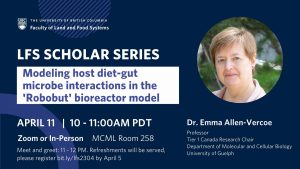Land and Food System Scholar Series
Invited scholar: Dr. Emma Allen-Vercoe
Hosted by: Crystal Karakochuk, Human Nutrition
Title: Modeling host diet- gut microbe interactions in the ‘Robobut’ bioreactor model
Abstract: There is now abundant evidence that the microbial consortium associated with a host – its microbiome – is critically important to the health of the host. The gut microbiome is the most diverse ecosystem in the human body and how we feed this ecosystem, through the diet that we consume, plays a major role in the shaping of the ecosystem in terms of its composition and function. However, studying complex microbial ecosystems from the human gut is not a trivial exercise. In this talk, I will describe the development of the Robogut as a model system to allow study of dietary shifts and their effects on the colonic microbiome, showcasing my lab’s work on microbiomes associated with Type 1 diabetes, colorectal cancer, and hunter-gatherer populations, respectively.
Biography: Dr. Emma Allen-Vercoe obtained her BSc (Hons) in Biochemistry from the University of London, and her PhD in Molecular Microbiology through an industrial partnership with Public Health England. Emma started her faculty career at the University of Calgary in 2005, with a Fellow-to-Faculty transition award through CAG/AstraZeneca and CIHR, to study the normal microbes of the human gut. In particular, she was among the few that focused on trying to culture these ‘unculturable’ microbes in order to better understand their biology. To do this, she developed a model gut system to emulate the conditions of the human gut and allow communities of microbes to grow together, as they do naturally. Emma moved her lab to the University of Guelph in late 2007, and has been a recipient of several Canadian Foundation for Innovation Awards that has allowed her to develop her specialist anaerobic fermentation laboratory further. This was boosted by the award of a Tier 1 Canada Research Chair in Human Gut Microbiome Function and Host Interactions, where she focuses on ‘missing microbes’ from the industrialized microbiome . In 2013, Emma co-founded NuBiyota, a research spin-off company that aims to create therapeutic ecosystems as biologic drugs, on a commercial scale. The research enterprise for this company is also based in Guelph.
Join in-person or via Zoom:
Date: April 11, 2023
Time: 10:00-11:00 AM PDT
Location: In-person at MCML 258, or via Zoom
This presentation will be followed by a meet and greet from 11:00 AM – 12:00 PM.
Refreshments will be served, please register here by April 5.
